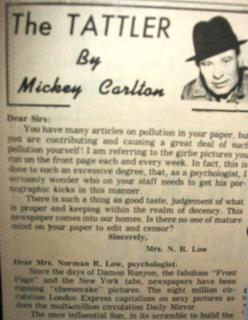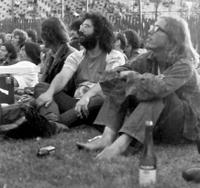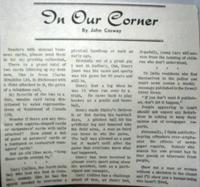Richmond Review - photographer
 Time for me to pay homage to the late, great Michael "Mickey" Carlton, editor, columnist, photographer, whose patient tutoring in tabloid journalism and photography at the Richmond Review would play a key role in my eventual 19-year stint with the Toronto Sun.
Time for me to pay homage to the late, great Michael "Mickey" Carlton, editor, columnist, photographer, whose patient tutoring in tabloid journalism and photography at the Richmond Review would play a key role in my eventual 19-year stint with the Toronto Sun.Carlton, with his signature fedora, was among the last of the Walter Winchell era cops and girlie photo newsmen when hired by the Review's elderly, cigar chomping owner/publisher Herb Gates in 1961.
Richmond, home of Vancouver International Airport, had never seen Carlton-style journalism before and while many readers complained about the scantily-clad women and cops and robbers headlines, Gates watched in awe as the weekly newspaper's circulation jumped by 15,000 readers.
The Review first caught my eye while working at the Optimist in nearby Ladner. It beckoned and when an opening for a full-time photographer was advertised, I was on the telephone immediately setting up an interview with Editor Carlton. He hired me when I said money was not as issue.
In 1969, the Review was a broadsheet newspaper located in a long, narrow office on Third Road next to an adjoining Chinese restaurant. Staff included Carlton, reporter/photographer Stuart Clugston, women's editor Jean Baker, an ad salesman and a receptionist. It was a small staff, but it was making big waves.
It was the Age of Aquarius but Carlton wanted all of the sex, drugs and rock and roll stories the Review could handle. Carlton's focus on gams and gangsters set the Review apart from most other newspapers in Canada (until the Toronto Sun made its debut in 1971).
My first photo assignment was an all-day race car event. Spent seven hours taking photos and six more hours in the darkroom developing, printing and re-printing my favourite photos. The next morning, proudly walked into Carlton's office with a pile of photos.
"Garbage, garbage, garbage," Carlton growled while holding up each photo before tossing it into a waste basket. My ego did a nose dive. I felt like a Broadway play that was being cancelled after its first performance. Several third-choice photos did get published but my future here looked dim.
Carlton, who mumbled something to Gates about this "new guy," could have said don't slam the door on your way out. But he didn't. Instead, he asked what I could do behind an Underwood typewriter. What followed were five creative and exciting years at the Review.
In fact, Carlton's reality check made me realize I had so much more to learn. His patience and guidance improved my writing and photography skills and a dramatic motorcycle accident photo later would win me a second-place spot news award in a B.C. weekly newspaper competition.
 Another accident photo haunted me for years. I was on my way to the Breakers nightclub in Point Roberts, Wa., one night when I saw a demolished car part way up a hydro pole. Got out my camera and walked up to one of the constables on the scene.
Another accident photo haunted me for years. I was on my way to the Breakers nightclub in Point Roberts, Wa., one night when I saw a demolished car part way up a hydro pole. Got out my camera and walked up to one of the constables on the scene."Any injuries?" I asked.
The constable didn't say a word, but pointed to something in the front seats. I walked closer and sitting upright were the charred remains of two teenagers. Later, in the darkroom, one of my photos showed the charred head of one of the victims.
(Photo at left: Carlton's tips on photographing beautiful women was productive, as this favourite photo shows.)
Gates and Carlton were always open to new ideas and that is how Backstage with John Cosway began in 1970. The column soon became part of a page or two of entertainment news in Richmond and nearby Vancouver.
During a prolonged Newspaper Guild strike that sidelined Vancouver Sun and Province reporters and photographers, Clugston and I provided extensive coverage of the 1970 Led Zeppelin concert in Vancouver. Clugston's exclusive photos of Robert Plant and Jimmy Page at the airport and at a press conference, plus a full page of concert photos, remain the talk among Led Zeppelin fans today.
We also ventured into Vancouver for concerts by the Rolling Stones, Elton John, the Kinks, Frank Zappa etc. In the early 1970's, the Review hired Rick McGrath, direct from the underground Georgia Strait newspaper, and fulltime photographer Brian Lee. We all shared in writing record reviews for record companies that endorsed our entertainment coverage.
But the most memorable event in my five years at the Review was the 1970 Festival Express weekend in Calgary. I was on vacation for two weeks and heading home to Richmond after a week in California when I decided to make a right turn and head for Calgary. Arrived in time to get a weekend media pass.
Checked into the York Hotel in downtown Calgary and headed for the evening concert with my camera and a good supply of film. Snapped crowd photos and of Janis Joplin, the Grateful Dead, Ian and Sylvia, Delaney and Bonnie and others on stage.
Had a couple of drinks after the concert and while taking the elevator to my fourth floor room, I heard a party going on at the second floor. Left the camera in my room and returned to the second floor. Many of the Festival Express performers were there partying.
 Crashed the party and for the next several hours, I absorbed, in great detail, the experience of partying with the likes of Janis Joplin, Ian and Sylvia, Buddy Guy, members of Sha Na Na, the Good Brothers etc. Got to bed at 4 a.m.
Crashed the party and for the next several hours, I absorbed, in great detail, the experience of partying with the likes of Janis Joplin, Ian and Sylvia, Buddy Guy, members of Sha Na Na, the Good Brothers etc. Got to bed at 4 a.m.The following night, after the final Festival Express concert, there was more partying on the second floor. Left the camera in my room and joined the party. (Photo at left: Jerry Garcia shares a bottle of wine while watching other performers.)
Two hours later, the booze ran out. Ian Tyson and I went downstairs in search of more alcohol but everything was closed. It was too early to end a farewell party, so I hopped in a taxi, went to the nearest bootlegger and bought two 24-packs of beer and several bottles of liquor. Even donated a sealed bottle of Tequila purchased in Tijuana a week earlier.
It was the least I could do for rock and rollers who contributed to one of Canada's most memorable series of concerts. The excursion by train added to the charm of it all.
The Review published some of my Festival Express photos and a story, but many thanks to the producers of last year's Festival Express DVD for reviving the film footage and for the flood of rock and roll memories, some made bittersweet by the deaths of Joplin and The Band's Rick Danko.
Richmond being the home of Vancouver International Airport, an Airport column was a natural and Carlton agreed. Writing the column opened doors to Canadian Pacific Airlines and Air Canada flights in exchange for travel stories. CP flew me to Paris and San Francisco and Air Canada flew me first class to Toronto aboard the inaugural 747 flight.
 As entertainment editor, also dabbled in restaurant reviews with a column called The Menu. Two memorable experiences from The Menu: getting food poisoning at the opening of an East Indian restaurant, and receiving a letter from McDonald's after questioning the quality and nutritional value of their food. Well, I did say McDonald's served great milk.
As entertainment editor, also dabbled in restaurant reviews with a column called The Menu. Two memorable experiences from The Menu: getting food poisoning at the opening of an East Indian restaurant, and receiving a letter from McDonald's after questioning the quality and nutritional value of their food. Well, I did say McDonald's served great milk.But my pet was the Backstage column, which opened a lot of doors to celebrities appearing at Richmond and Vancouver nightclubs and concert halls and at movie premieres.
Got stuck in a hotel elevator briefly with Warren Beatty and Julie Christie on the way to a penthouse reception following the 1971 Vancouver premiere of McCabe and Mrs. Miller. Beatty complained about the muffled sound in the old Orpheum Theatre and became quite anxious when the elevator stalled briefly. He admitted he had a fear of elevators at the best of times.
Management of Isy's downtown Vancouver nightclub allowed me a 20-minute interview with Buddy Rich and up front photographs of the famous drummer. Took a full roll of film catching the many faces of Rich on stage before patrons started to complain.
Also caught up to Rompin' Ronnie Hawkins at Isy's and sat down with him to show him photographs of him and the Hawks taken in Brampton, which he hadn't seen. Plus an interview and photo when Tiny Tim and his new bride came to town.
Xavier Hollander, aka the Happy Hooker, was a fascinating interview in a large stock room following a rowdy stage show in her new nightclub. She was about to demonstrate something when the janitor walked in to get a broom. Didn't get a chance to tell her the man she married was a former neighbor of mine from Euclid Ave. in Toronto.

When invited to a post-Rick Derringer/Edgar Winter rock concert party in a nearby hotel, I had no idea it would involve a personal test. The party began with someone unfolding a huge pile of white powder on a table. It was a snort-what-you-could buffet. Did I want to go beyond booze and pot? Drew the line and stuck to beer.
The Richmond Review was one big, entertaining party, but like they say, all good things do come to an end. The beginning of the end at the Review was Carlton's departure and a decision by Gates to retire and sell the newspaper to David Radler's Stirling newspaper chain.
I was working on a story in the new Review building Gates had purchased to get away from the rat-infested office next to the Chinese restaurant when three co-workers went to lunch. On their return, they said all agreed it was time to join the Newspaper Guild.
With my yes vote, the four-person application for ratification became the smallest union effort ever recorded in B.C. But it succeeded and we all got hefty raises and retroactive pay. Gates was still owner but he understood we joined the guild before the Stirling takeover to protect our jobs.
Not long after the departure of our beloved Gates, my drinking caught up to me. With the help of a former sports writer, who had become an AA executive, I got off the booze in the summer of 1974. Covering the nightclub scene sober just didn't have the same appeal.
Years later, while working on the Sun rewrite desk, columnist Paul Rimstead told me during the brief period he was off the booze that it was too difficult to write the type of column he wrote without drinking. He went back to drinking and it killed him. In 1974, I didn't think drinking to accommodate the job was an option worth considering.
Said farewell to some very good friends and co-workers in Richmond, including Carlton, who came to the farewell party, and headed home to Toronto. I was jobless, but had my payment-free and cherished 1969 Cougar convertible and $3,000 saved from selling used goods at weekend flea markets at the local drive-in and by not drinking.
The Richmond Review had been a dream job for five years and my thanks to the Mickey Carlton for making it all possible.
Next blog: The Toronto Sun - reporter

